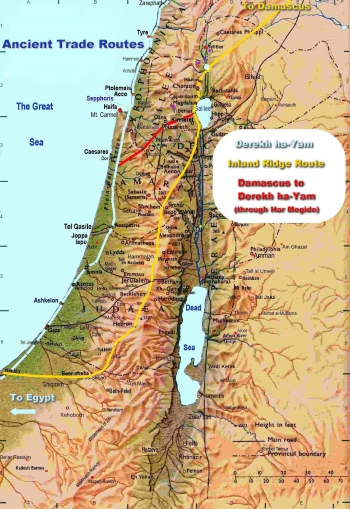wâ-Yei•râ′ 6th Eve

The A•qeid•âhꞋ
 |
After these things, ha-Ël•oh•imꞋ test-proved Avᵊrâ•hâmꞋ in Bᵊeir ShëvꞋa, saying to him, "Avᵊrâ•hâmꞋ!"
"Here I am!," Avᵊrâ•hâmꞋ responded.
Then ha-Ël•oh•imꞋ said, "Please take your son – your only one17 – whom you love, Yi•tzᵊkhâqꞋ, and get yourself going to the land of Mo•riy•âhꞋ; and cause a sacrifice to ascend there for an ascendance on one of the mountains, which I shall tell you."
So Avᵊrâ•hâmꞋ loaded his caravan pack-animals and wrapped a cloth saddle on his donkey. Confident that he could trap the needed sacrifice sëh in the mountains of Mo•riy•âhꞋ,22 he took two of his young ranch hands and his son, Yi•tzᵊkhâqꞋ, with him. He split wood for the ascendance, then got up and went to the place ha-Ël•oh•imꞋ had told him.
On a Yom Shᵊlish•iꞋ, Avᵊrâ•hâmꞋ could see the place in the distance. Then Avᵊrâ•hâmꞋ said to his two ranch hands, "Sit here with the donkey, while the boy and I go yonder where we will bow down; and then we will return to you."
Then Avᵊrâ•hâmꞋ took the wood for the ascendance and loaded it onto Yi•tzᵊkhâqꞋ, his son; and took the fire18 and kâ•sheirꞋ butcher's knife19 in his hand and the two of them continued on together.
Then Yi•tzᵊkhâqꞋ noticed that they hadn't brought a sëh to be sacrificed and asked his father about it. Avᵊrâ•hâmꞋ answered, "Ël•oh•imꞋ to a sëh for the ascendance, son." And the two continued together.
 |
When they came to the place20 that ha-Ël•oh•imꞋ had told him, Avᵊrâ•hâmꞋ built the mi•zᵊbeiꞋakh there, arranged the wood, ya•a•qōdꞋ Yi•tzᵊkhâqꞋ, his son, and placed him on the mi•zᵊbeiꞋakh, on top of the wood. Avᵊrâ•hâmꞋ reached out and took the kâ•sheirꞋ butcher's knife19 to butcher his son.
Then Avᵊrâ•hâmꞋ perceived a ma•lâkhꞋ ä', calling to him from the heavens, saying, "Avᵊrâ•hâmꞋ. Avᵊrâ•hâmꞋ!"
So Avᵊrâ•hâmꞋ answered, "I'm here."
The ma•lâkhꞋ ä' continued, "Don't put your hand on the boy. Don't do anything to him; because now I've known that you are a Yᵊr•eiꞋ Ël•oh•imꞋ, and you haven't kept back your son – your only one17 – from Me."
 |
When Avᵊrâ•hâmꞋ looked up after perceiving the voice, look – he noticed an aꞋyil, caught by its horns in one of the snares he had set nearby. So Avᵊrâ•hâmꞋ took the aꞋyil and caused it to ascend for an ascendance instead of his son.
So Avᵊrâ•hâmꞋ called the name of the place ä' éÄøÀàÆä; as it is said today: on Har ä' — éÅøÈàÆä
Then the ma•lâkhꞋ ä' called to Avᵊrâ•hâmꞋ a second time from the heavens, saying, "I swear by Myself, the speech of ä', that since you did this thing, and didn't keep back your son – your only one17, I will absolutely bless you and absolutely increase your seed like the stars in the heavens and the sand on the seashore, and your seed shall inherit21 the gates of your enemy. All the goy•imꞋ of hâ-ÂrꞋëtz shall bless themselves among your seed as a consequence of you having hearkened to My Voice."
So Avᵊrâ•hâmꞋ returned to his ranch hands. Then they got up and, together, returned to Bᵊeir ShëvꞋa, where he settled.

Optional parental preparation:
- Note 17 – ha-Ël•oh•imꞋ here excludes even recognizing Yi•shᵊm•â•eilꞋ as his son!

- Note 18 – That Avᵊrâ•hâmꞋ carried fire with him could indicate either of two things: [1] perhaps it was customary to carry fire on long trips (?) since igniting a fire was a lot of work before matches and lighters were invented, or [2] perhaps the family fire was regarded as a special "holy fire" out of heaven (in contrast to "strange/idolatrous fire"; æÈøÈä cf. wa-Yi•qᵊr•âꞋ 10.1), having been preserved from some special sanctifying event. See also
Godfire-stone in pâ•râsh•otꞋ Ki Ti•sâꞋ and PiꞋnᵊkhâs).
- Note 19 – äÇîÌÇàÂëÆìÆú, not äÇñÇëÌÄéï

- Note 20 – Har Mor•i•yâhꞋ, see bᵊ-Reish•itꞋ 22.2.

- Note 21 – åÀéÄøÇùÑ, not conquer. The only way to inherit the gate of an enemy is to attract that enemy to be absorbed into Tor•âhꞋ. Then the enemy, no longer an enemy, is absorbed; and his or her gate, no longer an enemy gate, without violence or changing hands, becomes inherited as another gate of Tor•âhꞋ.

- Note 22 – Snares that entangle horns or antlers are probably illegal nowdays. That's probably why I haven't been able to find a diagram or photo to illustrate. Using a bit of grain for bait, such a trap in Biblical times and, the destination being nearby a wildernous mountainous area known for game, would have been highly effective and regarded as reliable – no need to lead a sacrifice animal throughout the whole journey when one can easily and quickly snare an appropriate sacrifice animal nearby the mountainous destination site. Though the text recounts that Avᵊrâ•hâmꞋ carried fire for the sacrifice, he saw no need to lead a sacrific animal the whole way. The last-second appearance of the aꞋyil suggests that there was a time deadline associated with the sacrifice. Avᵊrâ•hâmꞋ chronologically antedated the origins of all three Khaj•imꞋ. A priori, the likely deadline was either Yom Tᵊru•âhꞋ of Yom ha-Ki•pur•imꞋ. As the deadline approached and Avᵊrâ•hâmꞋ had failed to snare an appropriate sacrifice animal… He deduced that ä' was requiring him to sacrifice his son, and he was being obedient. But, then, at the last moment… ä' provided the sacrifice animal.

Questions you might anticipate that your child might raise and be prepared to discuss:
- What's the difference between test and test-prove?
- What is splitting wood, and why split wood?
- What's a ranch hand and what do ranch hands do? (Note: in ancient times, this included sheep as well as cattle and goats, donkeys and horses. (Camels, apparently no so much in ancient Israel.)
- How does one carry fire?
Google+ registered author & publisher

